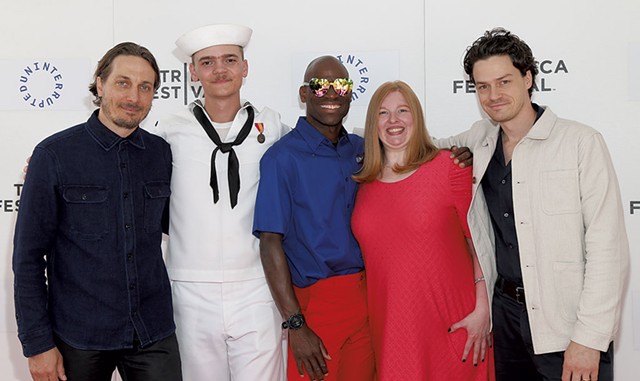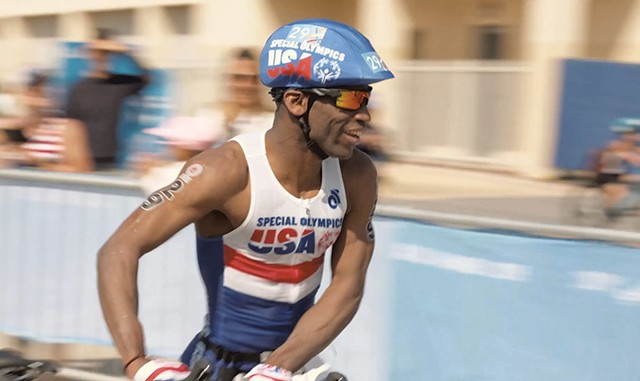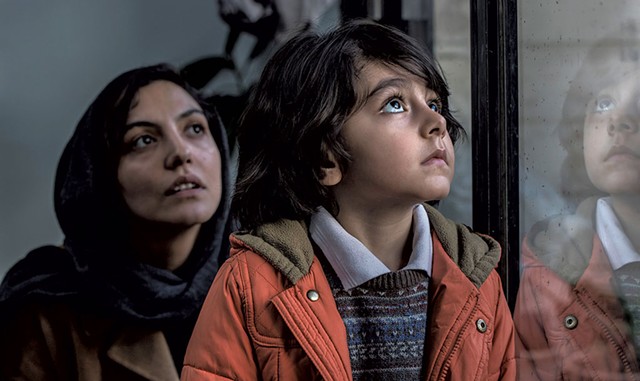Switch to the mobile version of this page.
Vermont's Independent Voice
- News
- Arts+Culture
- Home+Design
- Food
- Cannabis
- Music
- On Screen
- Events
- Jobs
- Obituaries
- Classifieds
- Personals
Browse News
Departments
Browse Arts + Culture
View All
local resources
Browse Food + Drink
View All
Browse Cannabis
View All
-
Culture

'Cannasations' Podcaster Kris Brown Aims to 'Humanize'…
-
True 802

A Burlington Cannabis Shop Plans to Host…
-
Business

Judge Tosses Burlington Cannabiz Owner's Lawsuit
-
Health + Fitness

Vermont's Cannabis Nurse Hotline Answers Health Questions…
-
Business

Waterbury Couple Buy Rare Vermont Cannabis License
Browse Music
View All
Browse On Screen
Browse Events
Browse Classifieds
Browse Personals
-

If you're looking for "I Spys," dating or LTRs, this is your scene.
View Profiles
Special Reports
Pubs+More
In a Vermont International Film Festival Documentary, Directors With Local Ties Fight Disability Stereotypes
Published October 11, 2023 at 10:00 a.m.
click to enlarge 

- Courtesy Of Soul Brother Photos
- From left: Ned Castle, Chris Wines, Trent Hampton, Melanie Holmes and Matt Day at the world premiere of All You Hear Is Noise
Documentarians Ned Castle and Matt Day didn't want their film about three Special Olympics triathletes to be overly sentimental or, as Castle put it, "inspiration porn."
In some ways, the film All You Hear Is Noise — screening at Vermont International Film Festival on October 22 and 24 — is a story of triumph: Three adults with intellectual disabilities find community and purpose through competing on an international stage at the 2019 Special Olympics World Games in Abu Dhabi. At first, Castle and Day concluded the documentary with the triathletes' results at the Games.
But they received feedback from advisers with disabilities that the story didn't feel complete. Mainstream media often portrays people with intellectual disabilities overcoming the odds while glossing over the realities of day-to-day life, Castle said. So Castle and Day decided to extend the documentary and follow athletes Trent Hampton, Melanie Holmes and Chris Wines when they went back home. Hampton struggled with a return to monotony after coming off the high of the Games, Holmes prepared to move to a new city, and Wines grappled with how his disability would be perceived as he joined the U.S. Navy. The result is a candid film that captures each athlete's distinct personality and moments of pride and struggle.
"We basically doubled down, took a deep breath [and] said, 'All right, we just shot and edited this whole film, but we need to keep going,'" Day said. "To build the film that we believed in, we realized we needed to spend more time with them outside of the bubble of the Special Olympics."
The completed vérité-style documentary, backed by SpringHill — the production company cofounded by pro basketball star LeBron James — debuted at the Tribeca Film Festival in New York City in June.
Neither Castle, 39, nor Day, 36, has a formal background in film. Day, a Charlotte native and University of Vermont alum who currently lives in Los Angeles, said he honed his skills through classes held by Vermont Community Access Media, which helped him produce a series of music videos featuring Vermont artists called "Naked Musicians." Castle, a Burlington resident, said he developed his storytelling philosophy while working as a media producer at the Vermont Folklife Center in Middlebury. Documentaries are often exploitative, he said, but he aims to shift the power imbalance between directors and their subjects.
That meant not proceeding until everyone was on board. About a decade ago, Castle began coaching with Special Olympics Vermont. The organization asked him to produce short films about its athletes, and Castle ended up shadowing Burlington resident Kate Bove, who had been selected to attend the World Games. Castle was enthralled by the idea of a film about her trip to Abu Dhabi, and he asked if she would want to be featured.
But Bove hoped to enjoy her experience at the Games without worrying about cameras. So Castle and Day got in touch with Special Olympics North America, which introduced them to Hampton and his teammates in the triathlon. Bove got involved as one of the documentary's advisers instead.
click to enlarge 

- Courtesy Of Vermont Interanational Film Festival
- Trent Hampton, an athlete featured in All You Hear Is Noise
Taking feedback from advisers with disabilities was key to helping the film evolve, Castle said. For example, the documentary was originally titled Special, but advisers helped Castle and Day realize the term denoted a sense of otherness. The title they landed on is a quote from Wines, allowing him to speak for himself about what it's like to have a disability.
"Imagine being in a room, and as soon as you disclose [your disability], you become the societal outlier," Wines says in the film. "You're there with a group of people, but you're by yourself in a box. And then instead of hearing voices, all you hear is noise."
Andrew Pulrang, a disability activist based in Plattsburgh, N.Y., advised Castle and Day to make a film that was emotionally resonant but not "syrupy" or "mushy." He also wanted the story to be told from the perspective of people with disabilities, rather than from a parent's or therapist's point of view.
"They're nondisabled folks doing this film about disability," Pulrang said of the directors, "and generally that wouldn't be the first type of thing I would be interested in. But I felt that they were very open and genuinely interested in getting a disability perspective on what they were doing."
Pulrang said the final cut of the film achieves his vision. The documentary doesn't include any asides or interviews with experts; instead, it consists of raw footage that offers a window into the athletes' everyday lives. Quieter scenes such as Hampton sitting on his bed and Holmes watching TV help humanize the subjects, Day said.
Those moments weren't always easy to capture. Uncomfortable with cameras following him into his bedroom, Hampton was originally hesitant to have those introspective moments filmed, Day said. As a result, the directors didn't require Hampton to sign a release form until he saw the first cut.
"At any time, even once we had filmed for a year and a half, he could have just said no," Day said. "That was very daunting, but I think it showed to him that we were going to honor our intentions and his desires."
Meanwhile, Holmes and her mom, Jennifer, were on board with the film from the start. Castle and Day quickly became family to them, Jennifer told Seven Days, and they were such a fly on the wall that at times she forgot they were filming.
Holmes said the film has a worthy message. "Even though we have disabilities, we should be treated as everyone else," she said. "We shouldn't be put down."
Castle said his own experience coaching Special Olympics athletes showed him that people with intellectual disabilities are often underestimated. He hopes his film "leaves people with questions" and fosters conversations about how society can be more accepting and inclusive.
"The expectations on making a film today are higher in order to not perpetuate those stereotypes," Castle said. People with disabilities "are humans, so it should be that they're represented in this film as being as complex and dynamic as they are in the real world."
Screen Scene
Festivalgoers can see more than 50 films over the course of 10 days at the 38th annual Vermont International Film Festival, running from Friday, October 20, to Sunday, October 29. This year's program includes an emphasis on film noir and features from Africa.
Screenings will be held in Burlington at Main Street Landing Performing Arts Center and the University of Vermont Recital Hall, as well as at the Essex Resort & Spa.
The festival kicks off with a first-ever partnership with the UVM Lane Series. Audiences will screen the 1945 noir film Hangover Square, about a composer who worries he has committed a crime after waking up with no memory of the previous night and a bloody knife in his pocket. A live concert with Theremin Noir will follow, featuring composer Bernard Herrmann's music from psychological thrillers Marnie, Vertigo and Psycho.
African selections throughout the festival include Between the Rains, a documentary about prolonged drought in northern Kenya; Goodbye Julia, a drama about the divide between northern and southern Sudanese communities; and Omen, the stories of four people accused of witchcraft in the Democratic Republic of the Congo.
Local stories will be highlighted in "After the Flood," a short film from Vermont Public depicting the July flood's damage in Montpelier. Following the screening, a panel of experts from the Nature Conservancy will discuss what can be done to mitigate future damage.
Speakers at the festival include Christine Yoo, director of the documentary 26.2 to Life, about a long-distance running group inside San Quentin State Prison in California; Dornaz Hajiha, director of Like a Fish on the Moon, about a couple whose son suddenly stops talking; and Bruce Goldstein, director of The Art of Subtitling, about the origin and evolution of subtitles.
The program also offers multisensory experiences, such as a Food, Film & Friendship event that features screenings of C.R.A.Z.Y., about a teenager who struggles to come to terms with his sexuality, and The Empire of Scents, which explores the power of the olfactory sense. Chefs from Québec and Vermont will serve food inspired by the movies.
The festival concludes with a screening of Scream of My Blood: A Gogol Bordello Story, a documentary about rock singer Eugene Hütz. The musician came to Burlington from Ukraine in 1992 as a political refugee before making a name for himself in New York City. As a final celebration, Hütz will perform in concert at Main Street Landing.
All You Hear Is Noise screens at Vermont International Film Festival on Sunday, October 22, 12:15 p.m., and Tuesday, October 24, 11:45 a.m., at Main Street Landing Film House in Burlington. $6-12. vtiff.org
Vermont International Film Festival, Friday, October 20, through Sunday, October 29, at Main Street Landing Performing Arts Center and the University of Vermont Recital Hall in Burlington and the Essex Resort & Spa. $6-15; $95 for a 10-pack; $150-250 for festival passes. Visit vtiff.org for full schedule.
The original print version of this article was headlined "The Long Game | In a Vermont International Film Festival documentary, directors with local ties fight disability stereotypes"
Got something to say?
Send a letter to the editor
and we'll publish your feedback in print!
Tags: Film
More By This Author
About The Author

Hannah Feuer
Bio:
Hannah Feuer is a culture staff writer at Seven Days. She's a 2023 graduate of Northwestern University, where she earned a bachelor's degree in journalism and economics. Her previous journalism experiences include stints with the Daily Northwestern, Reporters Without Borders, Medill Investigative Lab, Moment Magazine and Wisconsin Jewish Chronicle.
Hannah Feuer is a culture staff writer at Seven Days. She's a 2023 graduate of Northwestern University, where she earned a bachelor's degree in journalism and economics. Her previous journalism experiences include stints with the Daily Northwestern, Reporters Without Borders, Medill Investigative Lab, Moment Magazine and Wisconsin Jewish Chronicle.
Comments
Comments are closed.
From 2014-2020, Seven Days allowed readers to comment on all stories posted on our website. While we've appreciated the suggestions and insights, right now Seven Days is prioritizing our core mission — producing high-quality, responsible local journalism — over moderating online debates between readers.
To criticize, correct or praise our reporting, please send us a letter to the editor or send us a tip. We’ll check it out and report the results.
Online comments may return when we have better tech tools for managing them. Thanks for reading.
- 1. A Former MMA Fighter Runs a Wildlife Rehabilitation Center in Cabot News
- 2. The Magnificent 7: Must See, Must Do, May 1-7 Magnificent 7
- 3. Animal Communicator Amy Wild Wants a Word With Your Pet Animals
- 4. Student Film Documents Failed Plan to Cut Books From Vermont State University Libraries Film
- 5. This Manchester Center Family Is a National Show Horse Powerhouse Animals
- 6. Ever Since the Solar Eclipse, I’ve Been Feeling Weird Ask the Rev.
- 7. The Magnificent 7: Must See, Must Do, April 24-30 Magnificent 7
- 1. How a Vergennes Boatbuilder Is Saving an Endangered Tradition — and Got a Credit in the New 'Shōgun' Culture
- 2. Video: The Champlain Valley Quilt Guild Prepares for Its Biennial Quilt Show Stuck in Vermont
- 3. Waitsfield’s Shaina Taub Arrives on Broadway, Starring in Her Own Musical, ‘Suffs’ Theater
- 4. Video: 'Stuck in Vermont' During the Eclipse Stuck in Vermont
- 5. Pet Project: Introducing the Winners of the 2024 Best of the Beasts Pet Photo Contest Animals
- 6. This Manchester Center Family Is a National Show Horse Powerhouse Animals
- 7. Crossing Paths: An Eclipse Crossword 2024 Solar Eclipse








































